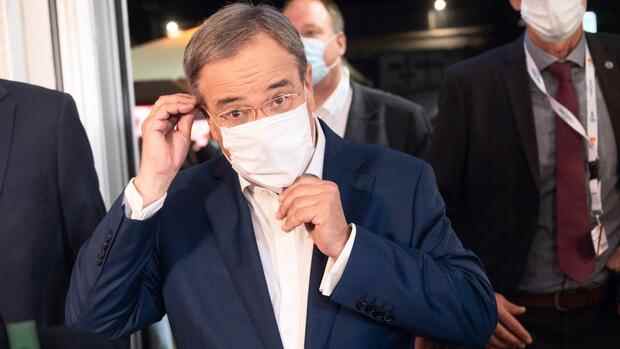The Union chancellor candidate did not succeed in the liberation strike.
(Photo: dpa)
On Sunday evening, the spectators of the second triall were offered exactly what they had been denied for a long time in the election campaign: a lively, sometimes emotional political debate.
For Armin Laschet it should be the break of the line. The Union’s candidate for chancellor had switched to attack, trying to pinch Olaf Scholz on the issues of red-red-green, Wirecard and money laundering. Laschet succeeded in what was seldom seen or heard before: he lured Scholz out of his reserve. The SPD chancellor candidate reacted almost emotionally for his circumstances.
But Laschet has not been able to turn things around. He is surrounded by the aura of the hapless. If he re-maps it looks petty. If he refers to successes in the state he ruled, he is not convincing. And the committed climate protector is only reluctantly taken away from him.
The controversial debate between Scholz and Laschet was right and important; However, it did not help the Union’s candidate for chancellor. People want the candidates to describe their vision of the future. You can’t win anyone over by looking in the rearview mirror.
Top jobs of the day
Find the best jobs now and
be notified by email.
In the past few days, the grandees of the Union had made do with incantations that have often been heard: surveys are only snapshots, it is now important to convince the many who are undecided. But that’s exactly what Laschet fails to do. The CDU boss, who recommended himself as “Federal Chancellor of Confidence” in his closing roll call on Sunday evening, does not come close to the competence and sympathy values of Scholz. And so the Union is facing difficult times. The chances of reversing the trend within the next two weeks are dwindling day by day.
The Union’s greatest chance can still be seen in the fact that the SPD makes mistakes. So far, the Social Democrats have avoided this surprisingly well. Theoretically, however, a stumbled appearance by party leader Saskia Esken could cost the SPD points and help the Union to make up for lost ground. But that is only a vague hope, by no means a strategy for the final spurt.
The topics of money laundering and Wirecard do not seem suitable to seriously harm the SPD and its top candidate. In this respect, Laschet’s attempt to place Scholz at this point was worthy of all honor.
Laschet’s replies were in vain even when he asked Scholz how he would deal with a red-red-green alliance, a tricky one. Scholz had said that anyone who wants to govern Germany has to commit to the transatlantic partnership and NATO. In other words, if the left can make an appropriate statement on these issues, they can get on the coalition boat. A steep template for Laschet. He did not transform her.
And so the signs point to a turning point. The Union must be prepared for the fact that the Chancellery will remain closed to it in the future. Nobody can say that Laschet did not always try. But that’s not enough.
More: “The inflation has a name – Olaf Scholz,” says the CDU politician and warns of a more welfare state. Merz calls on the Union Chancellor candidate Armin Laschet to attack Scholz because of the poor financial situation of the state.
.
